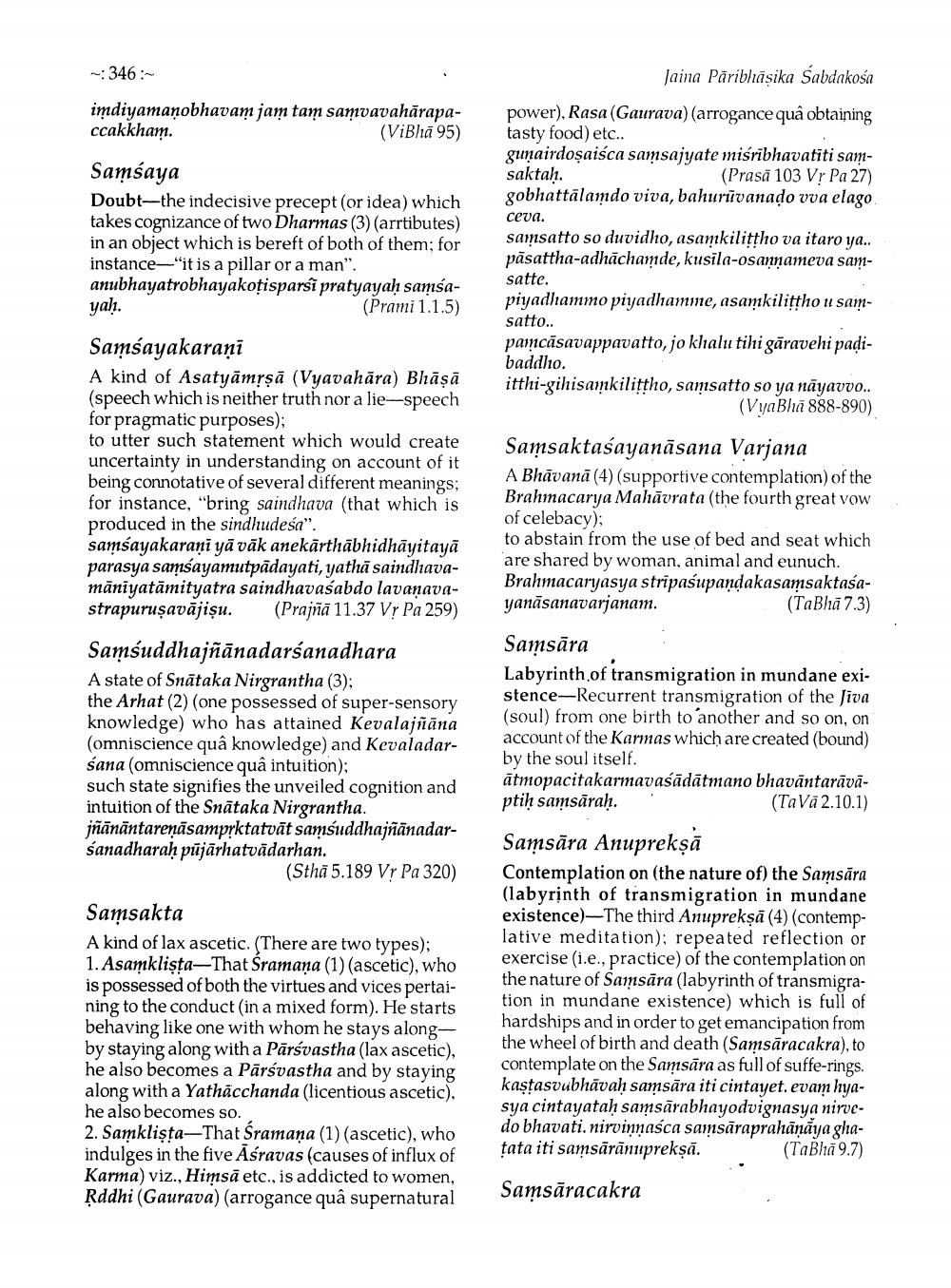________________
-346:
imdiyamanobhavam jam tam samvavahārapaccakkham.
(ViBhā 95)
Samsaya Doubt-the indecisive precept (or idea) which takes cognizance of two Dharmas (3) (arrtibutes) in an object which is bereft of both of them; for instance-"it is a pillar or a man". anubhayatrobhayakoțisparsi pratyayah sambayah.
(Prami 1.1.5)
Jaina Pāriblāsika Sabdakosa power), Rasa (Gaurava) (arrogance quâ obtaining tasty food) etc.. guņairdoşaiśca samsajyate misribhavatiti samsaktah.
(Prasā 103 Vr Pa 27) gobhattalamdo viva, bahuruvanado vva elago ceva. samsatto so duvidho, asamkilittho va itaro ya.. pāsattha-adhāchamde, kusila-osannameva samsatte. piyadhammo piyadhamme, asamkilittho u samsatto.. paincāsavappavatto, jo khalu tihi gāravehi padibaddlo. itthi-gihisainkilittho, samsatto so ya nāyavvo..
(Vya Bhā 888-890)
Samsayakaraņi A kind of Asatyāmışā (Vyavahāra) Bhāṣā (speech which is neither truth nor a lie-speech for pragmatic purposes); to utter such statement which would create uncertainty in understanding on account of it being connotative of several different meanings; for instance, "bring saindhava (that which is produced in the sindhudesa". samsayakarani yā vāk anekārthābhidhāyitayā parasya samsayamutpadayati, yathā saindhavamāniyatāmityatra saindhavasabdo lavanavastrapuruşavājisu. (Prajñā 11.37 V? Pa 259)
Samsaktasayanāsana Varjana A Bhāvanā (4) (supportive contemplation) of the Brahmacarya Mahāvrata (the fourth great vow of celebacy); to abstain from the use of bed and seat which are shared by woman, animal and eunuch. Brahmacaryasya stripasupandakasamsaktasayanāsanavarjanam.
(Tabhā 7.3)
Samsuddhajñānadarśanadhara A state of Snātaka Nirgrantha (3); the Arhat (2) (one possessed of super-sensory knowledge) who has attained Kevalajñāna (omniscience quâ knowledge) and Kevaladarsana (omniscience quâ intuition); such state signifies the unveiled cognition and intuition of the Snātaka Nirgrantha. jñānāntareņāsamprktatvāt samsuddhajñānadarsanadharah pūjārhatvādarhan.
(Sthā5.189 Vr Pa 320)
Samsāra Labyrinth of transmigration in mundane existence-Recurrent transmigration of the Jiva (soul) from one birth to another and so on, on account of the Karmas which are created (bound) by the soul itself. ātmopacitakarmavasādātmano bhavāntarāvāptiḥ samsāraḥ.
(TaVă 2.10.1)
Samsakta A kind of lax ascetic. (There are two types); 1. Asamklista—That Sramana (1) (ascetic), who is possessed of both the virtues and vices pertaining to the conduct in a mixed form). He starts behaving like one with whom he stays alongby staying along with a Pārsvastha (lax ascetic), he also becomes a Pārsvastha and by staying along with a Yathācchanda (licentious ascetic), he also becomes so. 2. Samklista-That Sramana (1) (ascetic), who indulges in the five Aśravas (causes of influx of Karma) viz., Himsā etc., is addicted to women, Rddhi (Gaurava) (arrogance quâ supernatural
Samsāra Anupreksā Contemplation on (the nature of the Samsāra (labyrinth of transmigration in mundane existence)-The third Anuprekṣā (4) (contemplative meditation): repeated reflection or exercise (i.e., practice) of the contemplation on the nature of Samsāra (labyrinth of transmigration in mundane existence) which is full of hardships and in order to get emancipation from the wheel of birth and death (Samsāracakra), to contemplate on the Samsāra as full of suffe-rings. kaştasvubhāvah samsāra iti cintayet evam hyasya cintayataḥ samsārabhayodvignasya nirvedo bhavati.nirvinnasca samsāraprahāņāya ghaţata iti samsārānuprekşā. (Tabha 9.7)
Samsāracakra




